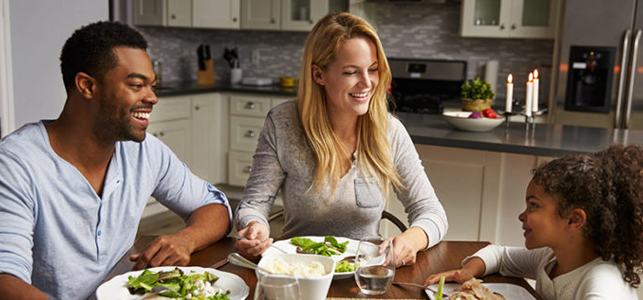Children's Emergency Department is now located in Children's Tower: 1001 E. Marshall Street.
Learn more
In the hustle and bustle of modern life, the concept of sitting down to a family dinner every night can seem quaint – but I assure you, the meaning behind it is as relevant as ever.
Rituals still matter. And, they matter even more to children. Rituals make us feel like we belong to something or someone. They offer a sense of stability and comfort. They help us navigate through good times and tough times.
Family dinners are a valuable ritual to observe with your family. If you can’t do it every night, that’s understandable; schedules don’t always allow. However, if you can make family dinner a priority for even a few nights each week, it will make a big difference.
Beyond basic nutrition and nourishment, family dinners offer learning experiences. For parents, it’s a time to learn what’s on your children’s minds. You always find out more when you sit down and talk, and the dinner table is a natural place to encourage conversation. The more often you have family dinner, the more accustomed your children will be to sharing things – big and small – about what’s going on in their lives.
You also have a number of opportunities to help children grow and develop during family dinner. First, you can work on social skills and manners. It’s not easy or natural for most children to sit still for an extended period of time, or to wait their turn to speak in a conversation. They have to practice, and family dinner allows them to do so in a place where they feel safe and supported.
In addition, family dinner provides the chance to give children more household responsibilities and chores. Even very young children can fold napkins to put on the table or carry their plates to the sink. As they get older, they can assist with more and more skilled tasks related to setting the table, cooking, and cleaning up. They stay invested in the entire experience – and you get a little help.
Rituals like family dinner won’t look the same for every family, of course. Here are a few suggestions to help you make the most out of your family time:
Adjust to fit your children’s stage of life. If you’ve got toddlers, they may not be able to sit still through an entire meal. Your teenagers may be juggling family time with a part-time job or extracurricular activities. It’s okay to make the ritual work for you, wherever you are right now.
Keep it positive. The goal is for family dinner to be a positive experience. While you may need to correct table manners now and then, try to hold more difficult conversations and lectures for another time and location.
Make it screen-free. Family dinner is about being together – and being present. Turn off the TV and ban phones from the dinner table. It’s very important that adults set an example by staying off their phones as well.
Ask specific questions. You can just let conversation flow – there’s no need to work through a set of predefined topics at the table. But, if things are a little quiet, try asking questions like “What made you happy today?” or “Who did you sit with at lunch today?” Sometimes those are easier for children to process than broader questions like “How was your day?” Another approach is the “High/Low” strategy, where everyone at the table takes turns sharing the best part of their day, as well as the most challenging moment.
Invite friends over. Children of all ages enjoy spending more time with friends, but including their friends in family dinner gives you a natural, casual way to get to know each other better. You also can gain a better understanding of what’s going on in their lives, especially for teenagers.
Don’t worry about incentives. If you’re introducing family dinner as a new routine, it can help to start by putting your children’s favorite foods on the menu. And, it’s a good idea to reinforce positive behaviors – especially for new concepts and tasks – with verbal reinforcement. Beyond that, however, you can relax and know that your children are getting built-in rewards: food and family connection.
Make it work for you. If you can’t do family dinner, try family breakfasts. Or weekly game nights. Or a designated weekend afternoon where each family member takes turns choosing what you do. The main idea is that you spend time together, interacting in a meaningful way and having fun as a family.
By Julie Linker, PhD, Virginia Treatment Center for Children